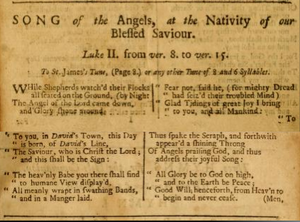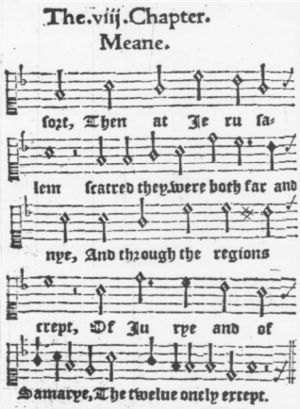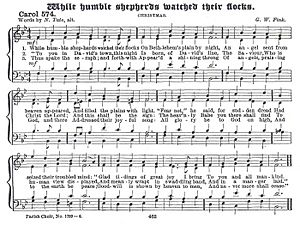While shepherds watched their flocks facts for kids
Quick facts for kids While shepherds watched their flocks |
|
|---|---|

"Song of the Angels at the Nativity of our Blessed Saviour" from A New version of the Psalms of David
|
|
| Genre | Hymn |
| Written | 1700 |
| Text | Nahum Tate, Edith Sanford Tillotson |
| Based on | Luke 2:8 |
| Meter | 8.6.8.6 |
| Melody | "Winchester Old" by George Kirbye, "Christmas" by George Frideric Handel, arranged by Lowell Mason |

"While shepherds watched their flocks" is a very old and popular Christmas carol. It tells the story of how angels appeared to shepherds to announce the birth of Jesus. The words are believed to have been written by Nahum Tate, an Irish writer who was also England's official poet, called the Poet Laureate. This carol is listed as number 16898 in the Roud Folk Song Index, which keeps track of folk songs.
The exact year Nahum Tate wrote the carol isn't known. However, the words first appeared in a book in 1700. This book was a special addition to a collection of Psalms (religious songs) by Tate and Nicholas Brady. For a long time, this was the only Christmas hymn that the Church of England allowed people to sing. Before 1700, only Psalms were permitted in church services. The carol's words are based on a story from the Gospel of Luke in the Bible (Luke 2:8–14).
Out of sixteen songs in that 1700 book, "While shepherds watched their flocks" is the only one still sung today. It was later published in other songbooks in the 1800s. People sing this carol to many different tunes. The two most common tunes are "Winchester Old" in the United Kingdom and a tune called "Christmas" in the United States. The "Christmas" tune was arranged by Lowell Mason from a song by George Frideric Handel.
Contents
Popular Tunes for "While Shepherds Watched"
Professor Jeremy Dibble from Durham University explains that "While shepherds watched" was the only Christmas hymn approved by the Church of England in the 1700s. This meant it could be shared widely with the Book of Common Prayer. Most other carols came from folk music and were seen as too informal for church. Because this carol was approved, many different tunes have been used with its words. The people who put together the English Hymnal even said it's impossible to print all the tunes sung to this hymn.
Winchester Old Tune
In the United Kingdom and other Commonwealth countries, the most common tune for "While shepherds watched" is "Winchester Old." It was first published in a songbook called The Whole Book of Psalmes in 1592. This tune itself came from an older piece of music. It was adapted from chapter VIII of Christopher Tye's music for the Acts of the Apostles from 1553.
George Kirbye, a composer from East Anglia, helped arrange tunes for The Whole Book of Psalmes. His arrangement of Tye's music was used for Psalm 84. The "Winchester Old" tune and the carol's words were likely first published together in 1861. This happened in an arrangement by William Henry Monk for Hymns Ancient and Modern.
Other Well-Known Versions
In the United States, the most common tune is "Christmas." This tune comes from an aria (a song for one voice) in an opera called Siroe by George Frideric Handel. David Weyman adapted it, and Lowell Mason arranged it in 1821. For example, the United Methodist Church chose "Christmas" for its hymnal in 1989. Before that, their 1966 hymnal used "Winchester Old."
Other hymnals, like The Presbyterian Hymnal (1990), include both "Winchester Old" and "Christmas." The Episcopal Hymnal 1982 has "Winchester Old" and another tune called "Hampton." This "Hampton" tune was composed by McNeil Robinson in 1985.
American Tunes
American composer Daniel Read published his tune "Sherburne" in 1785. This was a very popular tune, appearing in over seventy books before 1810. It is still sung today by Sacred Harp singers. It was also set to music in 1812 in a book called Harmonia Sacra.
The hymn tune "Cranbrook" was written in 1805. It was created by Thomas Clark, a shoemaker from Canterbury. The tune was named after the nearby village of Cranbrook. It was originally used for a different song, but in the UK, it's now better known as the tune for "On Ilkla Moor Baht 'at". Another popular tune from that time is Old Foster.
Regional and Modern Tunes
"While shepherds watched their flocks" has been set to many other tunes. Two common ones are "Martyrdom" and "Shackelford." "Martyrdom" was written by Hugh Wilson in 1800, with an arrangement by Ralph E. Hudson from around 1885. "Shackelford" was composed by Frederick Henry Cheeswright in 1889.
Robert Jackson, an organist in Oldham, Lancashire, wrote a tune for the carol in 1903. It's called "Jackson's Tune" and is still popular in Oldham. The English Hymnal also mentions "University" and "Crowle" as tunes sometimes used. In Cornwall and South Yorkshire, people often sing the carol to "Lyngham." This tune is usually linked to "O for a Thousand Tongues to Sing". Another traditional tune in Cornwall is "Northrop." In towns in the Pennines of West Yorkshire, like Todmorden, the tune "Shaw Lane" is used. "Sweet Chiming Bells" is a folk version sung in South Yorkshire and Derbyshire. It uses the carol's verses but adds a new chorus.
How the Words Have Changed
In the original 1700 book, the carol's title was "Song of the Angels at the Nativity of our Blessed Saviour." However, it is now mostly known by its first line, or incipit. In Nahum Tate's original writing, it started with Whilst Shepherds Watched Their Flocks. Most modern hymn books, though, print "While" instead of "Whilst."
A version from the 1800s by Gottfried W. Fink was titled While humble shepherds watched their flocks. It also had some rewritten parts, as you can see in the picture. The Hymnal 1982 published in the United States also updated some of the words. For example, it removed "Hallelujah" as the last line of the carol.
See also
 In Spanish: While shepherds watched their flocks by night para niños
In Spanish: While shepherds watched their flocks by night para niños
 | Aurelia Browder |
 | Nannie Helen Burroughs |
 | Michelle Alexander |


